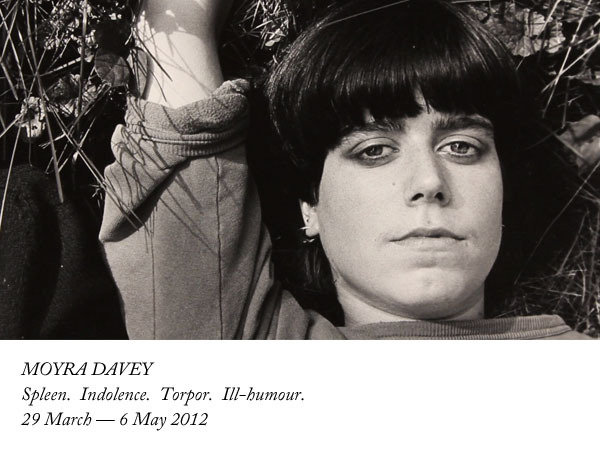Moyra Davey
dal 28/3/2012 al 5/5/2012
Segnalato da
28/3/2012
Moyra Davey
Murray Guy Gallery, New York
The exhibition pairs Davey's recent film Les Goddesses with two new sets of photographs and a long unseen series of black-and-white portraits shot in the late 1970s.

An unyielding reflection on the vicissitudes of photography, Davey’s exhibition pairs her recent film Les Goddesses with two new sets of photographs and a long unseen series of black-and-white portraits shot in the late 1970s.
Les Goddesses begins as Davey shuffles through her earliest photographs, which show her five sisters posing in assorted groupings in 1970s Montréal. As her camera focuses in on pores of skin, body hair and midriff tattoos, she reflects on Walter Benjamin’s dictum that “to do without people is for photography the most impossible of renunciations,” and narrates her ensuing retreat from the human figure, until her “subjects constituted little more than the dust on [her] bookshelves or the view under the bed.” While appraising her own reticence to make “biographical” work at a time when the truth claims of the photograph had been undermined, Davey reads her photographs alongside accounts of Mary Wollstonecraft and her rebellious daughters: the ill-fated Fanny Imlay, who drank laudanum at age 22, and Mary Shelley, who absconded with her stepsister Claire Clairmont and the poet Percy Bysshe Shelley on an infamous “six weeks tour” of France and Switzerland in the summer of 1816, joining up with Lord Byron on the shores of Lake Geneva.
Two new series of photographs are a rejoinder to Les Goddesses. Literally a postscript to the film, Subway Writers shows people captured in the act of writing on the subway, as Davey returns to photographing people for the first time in decades. Trust Me, in contrast, brings together photographs that ambulate around the human figure, showing dust, dried skin, a medicine cabinet, hair caught in the bathtub, an empty gin bottle, and a single image of a reclining young body. Both sets of images have been folded and mailed; Trust Me has been sent to the writer Lynne Tillman, who has affixed the various images with text: “Most people will divulge more than you want to know. People often want to recite the tragic events that have deformed their lives, offering up their pasts as a series of tableaus of deceptions, or unspeakable insults. . . All stories are somehow survival stories, with bad or good fortunes.”
Moyra Davey (b. 1958 Toronto, Canada) has been working in New York since the late 1980s. She has been the subject of two recent solo retrospectives, Long Life Cool White at the Fogg Art Museum at Harvard University (2008), and Speaker Receiver at the Kunsthalle Basel (2010). Her work was featured in the 2011 New Photography exhibition at The Museum of Modern Art, New York as well as in numerous recent group exhibitions, including Atlas — How To Carry The World On One’s Back? at the Reina Sofia, Madrid; After the Gold Rush at the Metropolitan Museum of Art, New York; Sound & Vision at the Art Institute of Chicago (where her Copperhead Grid is currently on view); Mixed Use, Manhattan also at the Reina Sofia; and If You Lived Here You’d Be Home By Now at the CCS Bard Hessel Museum of Art, Annandale-on-Hudson, New York. Major essays on her work appear in the current issue of Afterall and the forthcoming May 2012 issue of Frieze.
From April 11 — 15, Les Goddesses will screen daily at The Whitney Museum of American Art as part of the 2012 Whitney Biennial, where Davey also has two new groups of photographs on view. On Sunday, April 15 at 4pm, the Whitney will host a public conversation between Davey and Lynne Tillman.
Opening: Thursday, March 29, from 6 — 8 pm
Murray Guy Gallery
453 West 17 Street - New York
Hours: 10am - 6pm Tuesday – Saturday
Free admission



